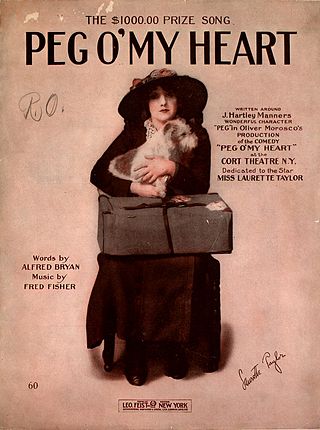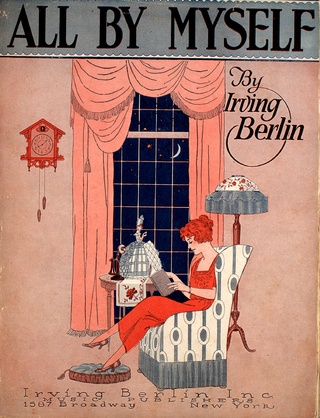Related Research Articles

"Peg o' My Heart" is a popular song written by Alfred Bryan (words) and Fred Fisher (music). It was published on March 15, 1913 and it featured in the 1913 musical Ziegfeld Follies.
"You'll Never Know", sometimes referred to as "You'll Never Know " in later years, is a popular song with music written by Harry Warren and the lyrics by Mack Gordon. The song is based on a poem written by a young Oklahoma war bride named Dorothy Fern Norris.
"It's Magic" is a popular song written by Jule Styne, with lyrics by Sammy Cahn, published in 1947. They wrote the song for Doris Day in her Warner Brothers film debut, Romance on the High Seas. In the autumn of 1948 Vic Damone, Tony Martin, Dick Haymes, Gordon MacRae and Sarah Vaughan all charted on Billboard magazine charts with versions of the song, but none as successfully as Day's recording. "It's Magic" received an Academy Award nomination for Best Song, but in March 1949 lost to "Buttons and Bows" by Jay Livingston and Ray Evans.
"Linda" is a popular song written, taking its name from then-one-year-old Linda McCartney. It was written by Jack Lawrence and published in 1946.
"The One I Love (Belongs to Somebody Else)" is a popular song composed by Isham Jones with lyrics by Gus Kahn. The song was recorded by Isham Jones' Orchestra on December 21, 1923, at Brunswick Studios in New York City, and published on January 7, 1924. On January 17 in Chicago, Jones recorded another version, with Al Jolson on lead vocals. Both versions made the charts that Spring, with Jolson's peaking at number 2, and Jones' at number 5. Sophie Tucker recorded her version February 1924, released on Okeh 40054.
"Imagination" is a popular song with music written by Jimmy Van Heusen and the lyrics by Johnny Burke. The song was first published in 1940. The two best-selling versions were recorded by the orchestras of Glenn Miller and Tommy Dorsey in 1940.
"I May Be Wrong " is a popular song. The music was written by Henry Sullivan, the lyrics by Harry Ruskin. The song was published in 1929 and it was included in the musical revue Murray Anderson's Almanac which ran for 69 performances at Erlanger's Theatre on Broadway in 1929. It is said that the song was written on-demand for John Murray Anderson.
"Put 'em in a Box, Tie 'em with a Ribbon, and Throw 'em in the Deep Blue Sea" is a popular song. The music was written by Jule Styne, the lyrics by Sammy Cahn. The song was published in 1947, and was further popularized in the 1948 movie Romance on the High Seas, where it was sung by Doris Day accompanied by the Page Cavanaugh Trio. The lyrics deal with a person who is through with love and therefore metaphorically wants to throw everything away in a box into the sea.
"I Should Care" is a popular song with music by Axel Stordahl and Paul Weston and lyrics by Sammy Cahn, published in 1944. Cahn said that the title came to him by the time they played the first 4 bars. It first appeared in the MGM film Thrill of a Romance. The original recording by Ralph Flanagan and His Orchestra, with vocalists: Harry Prime and The Singing Winds was made at Manhattan Center, New York City, on July 18, 1952. It was released by RCA Victor Records as catalog number 20-4885 and by EMI on the His Master's Voice labels as catalog number B 10389.
"But Beautiful" is a popular song with music written by Jimmy Van Heusen, the lyrics by Johnny Burke. The song was published in 1947.
"Galway Bay" is the name of at least two different songs.
"Mañana " is a popular song that was written by Peggy Lee and her first husband Dave Barbour and published in 1947. Peggy Lee recorded the song on November 25, 1947, with Dave Barbour's orchestra as backing. Released by Capitol Records, it became her biggest chart hit. For the week ending January 23, 1948, the single entered Billboard's Best Sellers chart, where it spent 21 weeks, nine of those at number one.
"Laura" is a 1945 popular song. The music, composed by David Raksin for the 1944 movie Laura, which starred Gene Tierney and Dana Andrews, is heard frequently in the movie. The film's director, Otto Preminger, had originally wanted to use Duke Ellington's "Sophisticated Lady" as the theme, but Raksin was not convinced that it was suitable. Angered, Preminger gave Raksin one weekend to compose an alternative melody. Raksin later said, and maintained for the rest of his days, that when, over that weekend, his wife sent him a "Dear John" letter, the haunting theme seemed to write itself.
"Johnny One Note" is a 1937 show tune from the 1937 Rodgers and Hart musical Babes in Arms, where it was introduced by Wynn Murray. Judy Garland sang it in the Rodgers & Hart biopic Words and Music (1948).
"(You'd Be So) Easy to Love" is a popular song written by Cole Porter for William Gaxton to sing in the 1934 Broadway show Anything Goes. However Gaxton was unhappy about its wide vocal range and it was cut from the musical. Porter re-wrote it for the 1936 film Born to Dance, where it was introduced by Eleanor Powell, James Stewart, and Frances Langford under its alternate title, "Easy to Love". The song was later added to the 1987 and 2011 revivals of Anything Goes under the complete title "You’d Be So Easy to Love".

"All by Myself" is a popular song written by Irving Berlin, published in 1921.
"Rockin' Chair is a 1929 popular song with lyrics and music composed by Hoagy Carmichael. Musically it is unconventional, as after the B section when most popular songs return to A, this song has an A-B-C-A1 structure. Carmichael recorded the song in 1929, 1930, and 1956. Mildred Bailey made it famous by using it as her theme song. Like other 1920s standards, "Rockin' Chair" relied on the stereotypes of minstrelsy, citing "Aunt Harriet" from the anti-Uncle Tom song "Aunt Harriet Becha Stowe" (1853).
Blue and Sentimental is a song written by Count Basie, Jerry Livingston, and Mack David. It was written in 1938 and recorded by the Count Basie Orchestra on 6 June that year.
"For You" is a song written by Joe Burke and Al Dubin in 1930. It was introduced in the Mack Sennett short Billboard Girl (1932) when it was sung by Bing Crosby. The best known version was from musician Rick Nelson in 1964, when it peaked at #6 on the Billboard Hot 100 and at #66 on the year end.

Joseph Perkins Greene was an American songwriter, best known for "Across the Alley from the Alamo", "And Her Tears Flowed Like Wine" (1944), and "Don't Let the Sun Catch You Cryin'" (1946).
References
- ↑ "Almost Remembering the Alamo". April 2014.
- 1 2 Gilliland, John. (197X). "Pop Chronicles 1940s Program #20 - All Tracks UNT Digital Library". Digital.library.unt.edu. Retrieved 2021-02-06.
- ↑ "Songs written by Joe Greene". Music VF. Retrieved 14 July 2017.
- ↑ "Discogs.com". Discogs.com. Retrieved December 19, 2017.
- ↑ Jazz Times. Jazztimes. 2008. p. 111.
- ↑ Lord, Tom (2003). The Jazz discography. Lord Music Reference. ISBN 978-1-881993-06-3.
- ↑ "78Discography". 78Discography. Retrieved 8 February 2016.